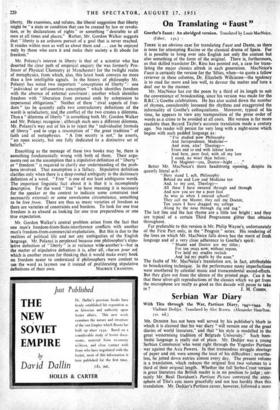44 Freedom" Re-Defined THESE two books are written with an
identical purpose; to recom- mend a new definition of " liberty." Not an identical definition, but two of the same sort. Neither the Minister for Commonwealth Relations nor the Professor of Social Studies at Manchester is interested in the dictionary definition of the word, in the way " liberty " is commonly used by English-speaking people • both offer a stipulative definition, or a specification of what each of them means by " liberty " and would like to persuade others to accept as the correct formula.
Mr. Gordon Walker's discussion of liberty is coupled with a detailed and powerfully argued case for pessimistic Socialism. He criticises optimistic (and orthodox ?) Socialism for entertaining foolish hopes of building a heaven on earth, and insists that immoral societies are the product of immoral mankind. Because of the wickedness of the human heart, the Good Society will ever be a mischievous chimera ; but Mr. Gordon Walker is not unhopeful of a Better Society. Moreover he seems to think the labouring class rather less immoral than the rest of us, for " the workers must lead• society," he says, " on the delicate road " of social change. Apart from this faintly incongruous faith in the redemptive mission Of the proletariat, Mr. Gordon Walker's thesis is, for a Labour Party leader, profoundly conservative. - He rejects liberalism. In his own words he seeks to resolve " the dilemma of liberty—either inalienable rights or tyranny, either the impotent or the total State "—by discovering a new concept of
liberty. He examines, and refutes, the liberal suggestion that liberty might be " a state or condition that can be created by law or revolu- tion, or by declarations of rights " or something " desirable to all men at all times and places." Rather, Mr. Gordon Walker suggests that " liberty is an arduous pursuit of a goal that is never reached. It resides within men as well as about them and . . . can be enjoyed only by those who earn it and make their society a fit abode for freedom."
Mr. Polanyi's interest in liberty is that of a scientist who has deserted the clear path of empirical enquiry (he was formerly Pro- fessor of Physical Chemistry at Manchester) for the twilight realm of metaphysics, from which, alas, this latest book conveys no more than a few intelligible signals. In the history of philosophy Mr. Polanyi has noted two important " conceptions of liberty ": one " individual or self-assertive conception " which identifies freedom with the absence of external constraint ; another which identifies freedom with " liberation from personal ends by submission to impersonal obligations." Neither of these " rival aspects of free- dom" (as he quaintly calls two contradictory definitions of the word) is satisfactory, and the conflict of the two creates a dilemma. Thus a " dilemma of liberty " is something both Mr. Gordon Walker and Mr. Polanyi recognise ; although each sees-a different dilemma. Mr. Polanyi's way out of his is to reject the " individualist formula of libe,fly " and to urge a resumption of " the great tradition " of faith and of metaphysics. " A free society is not," he asserts, "an open society, but one fully dedicated to a distinctive set of beliefs."
Ennobling as the message of these two books may be, there is something fundamentally wrong with both of them. Their argu- ments rest on the assumption that a stipulative definition of " liberty " or " freedom " is required to clarify our understanding of the prob- lems involved. That assumption is a fallacy. Stipulative definition clarifies only when there is a deep-rooted ambiguity in the dictionary definition of a word. " Free " is one of our least ambiguous words. The important linguistic fact about it is that it is incompletely descriptive. For the word " free " to have meaning it is necessary for the speaker or the context to indicate some constraint (not necessarily external) or some unwelcome circumstance, something to be free from. There are thus as many varieties of freedom as there are varieties of constraints and burdens. To look for one true freedom is as absurd as looking for tone true preparedness or one true expectation.
Mr. Gordon Walker's central problem arises from the fact that one man's freedom-from-State-interference conflicts with another man's freedom-from-commercial-exploitation. But this is due to the realities of political life and not any ambiguities of the English language. Mr. Polanyi is perplexed because one philosopher's stipu- lative definition of " liberty " is at variance wklk• another's—but in the matter of stipulative definition it is, after all, chacun pour sot. which is another reason for thinking that it would make every book on freedom easier to understand if philosophers were content to use the word as laymen use it instead of proliferating stipulative































 Previous page
Previous page